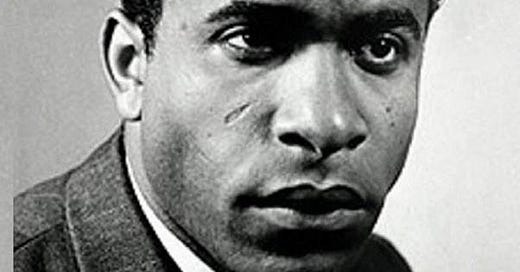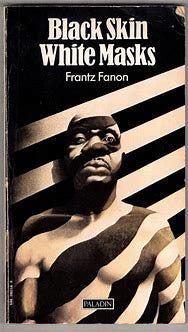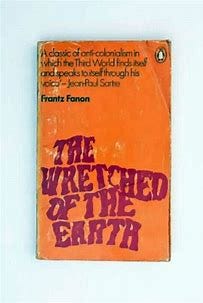Introduction: Life and Intellectual Journey
In my view one of the most influential decolonisation thinkers of the 20th century was Frantz Fanon. Frantz Fanon, born on 20th July 1925, in the French colony of Martinique, emerged as a prominent figure in the anti-colonial movement and a critical thinker in the fields of psychoanalysis and philosophy. Growing up in a Caribbean society deeply influenced by French colonialism, Fanon experienced first hand the oppressive nature of the colonial system, which gave shape to his worldview and intellectual trajectory.
After completing his secondary education in Martinique, he migrated to France in 1943 to join the French forces during World War II. However, he soon became disillusioned with France's discriminatory treatment of Black soldiers and equally disillusioned with the racism prevalent in French society.
Fanon's involvement in the Algerian War of Independence, which began in 1954, further shaped his political consciousness and provided him with direct engagement in the decolonisation movement. He served as a psychiatric advisor to the National Liberation Front (FLN) in Algeria, using his expertise as a psychiatrist to support the psychological well-being of the Algerian freedom fighters.
Fanon wrote four books in his lifetime:
"Black Skin, White Masks" - published in 1952
"A Dying Colonialism" - published in 1959
"The Wretched of the Earth" - published in 1961
"Toward the African Revolution" - published in 1964
The first three books were published during his lifetime, while Toward the African Revolution is a collection of his essays and shorter writings that was compiled and published posthumously in 1964. He passed on in 1961 as a result of leukaemia related illness.
While his body of published work is modest, his influence has been profound and far-reaching in post-colonial studies, critical race theory, and revolutionary movements throughout the global south.
Black Skin, White Masks (1952), his first major work explores the psychological effects of colonialism and racism on both Black and white people. In this text, Fanon examines how colonialism creates a fundamental alienation in the Black subject who must navigate a world that devalues Blackness while elevating whiteness as the ideal.
The book analyses several key themes:
The psychological impact of racism on Black identity
Language as a tool of colonisation (particularly how adopting the coloniser's language affects the colonised)
The objectification of Black bodies
Interracial relationships and their psychological dimensions
The struggle for recognition in a racist society
Fanon draws on his own experiences as a Black man from Martinique living in France, combining personal narrative with philosophical analysis. He incorporates ideas from psychoanalysis, phenomenology, and existentialism, engaging with thinkers like Hegel, Sartre, and Lacan to develop his arguments.
The title Black Skin, White Masks refers to the phenomenon where colonised people adopt the cultural standards, language, and behaviours of their colonisers while struggling with their own racial identity. Fanon argues this creates a deep psychological split that leads to alienation and various psychological defences.
This work established Fanon as an important theorist on race and laid the groundwork for his later, more explicitly political works on decolonisation.
A Dying Colonialism analyses the social transformations taking place during the Algerian War of Independence against French colonial rule.
The book examines how the revolutionary struggle changed Algerian society and culture from within. It explores several key aspects:
The transformation of traditional Algerian family structures
The evolving role of women in revolutionary society
How radio was used as an instrument of resistance
The changing attitudes towards Western medicine
How European-descended Algerians (pieds-noirs) related to the revolution
Unlike his more theoretical works, A Dying Colonialism offers a practical, sociological observation of revolution in progress. Fanon documents how colonised people actively forge new cultural forms and social relations through their struggle for liberation. The book demonstrates his belief that national liberation is not merely about political independence but involves the creation of a new humanity and consciousness.
Throughout the text, Fanon emphasises how the revolution created opportunities for Algerians to overcome traditional social divisions and develop a unified national identity in opposition to colonial rule. He portrays decolonisation as a creative rather than merely destructive process.
The Wretched of the Earth: A Psychoanalytical Approach to Decolonisation
Fanon's most renowned work, The Wretched of the Earth, is a seminal text that offers a critical examination of the psychological impacts of colonisation. Taking a psychoanalytical approach, Fanon explores the dehumanising effects of colonisation on both the individual and the nation.
In this work, Fanon examines the broader social, cultural, and historical dynamics that underpin the establishment and perpetuation of colonial systems. He highlights the violence, repression, and exploitation that characterise the relationship between the coloniser and the colonised. Through his exploration of the colonised world from the perspective of the colonised, Fanon offers a deep critique of the dehumanising effects of colonisation and its psychological impacts.
Fanon argues that colonisation is not only an economic and political enterprise but also a deeply psychological and existential one that fundamentally alters the identities and subjectivities of both colonised individuals and the colonised nation as a whole. Through the imposition of colonial power, the coloniser establishes a system of racial hierarchy, undermining the humanity of the colonised and enacting systems of violence, discrimination, and exploitation.
At the same time, Fanon emphasises that colonisation's dehumanising effects extend beyond the individual level to the nation as a collective entity. He contends that colonisation erodes the cultural, social, and political fabric of the colonised society, suppressing their histories, traditions, and cultural practices. This erasure of identity and collective memory further perpetuates the dehumanisation and alienation of the colonised people.
Main Arguments in The Wretched of the Earth
Fanon presents several key arguments in The Wretched of the Earth:
The role of violence in the struggle for liberation: Fanon highlights the inherent violence within the colonial system and asserts that violence is often a necessary tool in the struggle for liberation. He argues that violence becomes a means of resistance against oppression and a way for the colonised to reclaim their agency and humanity.
The psychological impact of colonisation on the colonised: Fanon explores the psychological consequences of colonialism, including the development of neurosis, psychosis, and other mental disorders. He argues that the experience of colonisation leads to an internal fragmentation of identity and a sense of inferiority among the colonised.
The failure of assimilation and cultural alienation: Fanon critiques the notion of assimilation and argues that it only perpetuates the domination of the colonisers. He emphasises the importance of cultural pride and the preservation of indigenous cultures as a means of reclaiming independence and resisting colonisation.
The necessity of decolonisation: Fanon asserts that true liberation requires decolonisation at the political, economic, and psychological levels. He calls for the complete removal of colonial structures and the establishment of independent, self-governing nations.
The potential for solidarity and global revolution: Fanon believes that the struggle against colonialism extends beyond national borders and requires international solidarity. He argues for a global revolution against oppressive systems and the dismantling of imperialism.
On Chapter 3 - The Pitfalls of National Consciousness,
In my reading of the great man, Chapter 3 of Wretched is the most important in terms of understanding the post-colonial context. The chapter focuses on the national bourgeoisie.
The key arguments Fanon presents in this chapter include:
Underdeveloped Character: The national bourgeoisie in formerly colonised nations is underdeveloped and lacks the economic power, entrepreneurial capacity, and innovative spirit of the European bourgeoisie. Unlike the European bourgeoisie who led industrial revolutions, this class doesn't accumulate capital for reinvestment.
Intermediary Role: The national bourgeoisie serves as an intermediary or "transmission line" between foreign capital and the local economy, rather than creating an authentic national capitalism. They become a "sort of little caste" preoccupied with their own enrichment.
Mimicry of Colonisers: After independence, this class simply steps into the positions vacated by colonial administrators and adopts their values, lifestyle, and consumption patterns rather than forging a new path. They become obsessed with occupying the positions formerly held by colonisers.
Lack of Vision: Instead of investing in productive industries or agriculture, the national bourgeoisie focuses on the tertiary sector (services, commerce) and quick profits. They fail to develop a national economic plan oriented toward genuine development.
Political Consequences: This economic failure leads to political failures - namely single-party states, dictatorships, and the suppression of political opposition in the name of "national unity." The national bourgeoisie uses nationalism as a tool to maintain power.
Cultural Bankruptcy: Culturally, this class adopts Western modes rather than developing authentic national culture rooted in the struggles of the people.
Historical Mission Betrayed: Fanon argues that the national bourgeoisie betrays its historical mission of transforming the nation and instead becomes a tool of neocolonialism.
Alternative Path: Fanon suggests that true liberation requires bypassing this class entirely, with power flowing directly to the peasantry and working classes who must be politically educated about the real mechanisms of economics and power.
This chapter represents one of Fanon's most influential analyses, particularly for post-colonial societies struggling with the challenges of genuine independence and development after formal decolonisation.
Fanon's National Bourgeoisie and the East Asian Exception
Chapter 3 of Wretched effectively captures the nature of African, Latin American and the Caribbean bourgeoisie and their failure to transform formerly colonised societies. However, the experience of East Asia presents a fundamental counterpoint worth exploring further.
While acknowledging this exception I don’t believe it invalidates Fanon's core insights, rather, it provides nuance to our understanding of possible post-colonial trajectories.
The East Asian Divergence
The leadership class in countries like Singapore, Taiwan, South Korea and to some extent China demonstrated characteristics markedly different from Fanon's conception of the national bourgeoisie:
Developmental Orientation: Unlike the consumption-focused, extractive bourgeoisie Fanon describes, East Asian leadership implemented robust state-directed industrial policies that prioritised economic development and strategic integration into global markets rather than mere resource extraction.
National over Class Interests: These leaders often subordinated immediate class interests to national developmental goals. They weren't simply mimicking colonial powers or functioning as passive intermediaries for foreign capital but strategically engaging with global markets while systematically building domestic industrial capacity.
Productive Investment: Contrary to Fanon's national bourgeoisie who avoided productive sectors in favour of quick profits in services and commerce, East Asian leaders deliberately fostered industrial transformation through targeted investments, protectionist policies when necessary, and strategic export promotion.
State Capacity and Autonomy: These states maintained substantial bureaucratic and administrative capacities that could implement comprehensive development strategies rather than exhibiting the weak, dependent governance Fanon describes. The state maintained significant autonomy from both domestic elite interests and foreign capital.
Contextualising the Difference
Several factors may explain this divergence:
Historical context: Many East Asian states faced existential security threats (Cold War dynamics, proximity to communist powers) that created urgent imperatives for development
Colonial legacies: Different patterns of colonisation left varying institutional foundations
Cultural factors: Some scholars point to Confucian traditions emphasising education, meritocracy and collective welfare
Geopolitical positioning: Cold War realities meant American support for capitalist development in these regions, providing market access and technical assistance
Limitations and Parallels
Despite these differences, some elements of Fanon's critique remain relevant even in the East Asian context:
The authoritarian nature of many developmental states echoes Fanon's concerns about political suppression and democratic deficits
The close relationships between state and business elites created their own forms of corruption and patronage networks
Cultural dynamics often still privileged Western models and education systems
Inequality and exploitation of labour remained significant issues, even as overall development progressed
Implications for Post-Colonial Theory
The East Asian experience suggests that the path dependency Fanon identified could be overcome through specific institutional arrangements and strategic choices, though not necessarily through the mass mobilisation of peasantry and working classes that he advocated. This presents an important qualification to post-colonial theory that merits further investigation.
Rather than invalidating Fanon's analysis, the East Asian exception illuminates the contingent nature of post-colonial development and the possibility of alternative paths beyond the dichotomy of neocolonial extraction or revolutionary transformation.
What does this tell us about Power?
Power in colonial contexts operates in multiple interconnected dimensions, extending far beyond mere political or military control. From Fanon we get at least five key aspects about power:
First, power in colonialism works through psychological domination. Fanon's analysis shows that colonisers don't just control territory and resources, they establish power by infiltrating the very minds of the colonised. The "coloniser's dehumanising gaze" creates what Fanon describes as a psychological complex where colonised peoples internalise negative stereotypes about themselves. This psychological dimension means power becomes self-perpetuating; the colonised begin to enforce their own subordination through "feelings of self-hatred, inferiority, and alienation." This represents perhaps the most insidious form of power, one that operates within the psyche itself. Looked at in this way Bob Marley’s exhortation to the colonised - Emancipate yourself from mental slavery … none but ourselves can free our minds - becomes an important part of the Fanonian conversation.
Second, Fanon demonstrates that power works through cultural erasure and replacement. Colonial power systematically "suppresses histories, traditions, and cultural practices" of the colonised. By eroding "the cultural, social, and political fabric of the colonised society," colonial powers eliminate alternative ways of being and knowing. This cultural dimension of power allows colonisers to present their worldview as universal and inevitable rather than as one perspective among many.
Third, power in colonial contexts is maintained through structural violence. Fanon highlights that colonialism inherently contains violence, not just physical brutality but also systemic oppression through economic exploitation, racial hierarchies, and discrimination. He points us to how colonisers "establish a system of racial hierarchy, undermining the humanity of the colonised and enacting systems of violence, discrimination, and exploitation." This reminds us that power often functions through seemingly neutral institutions and systems.
Fourth, importantly Fanon reveals that effective resistance requires understanding how power operates. This suggests that power cannot be effectively contested without first understanding its specific mechanisms in a given context. Simply fighting against power without theorising it is insufficient.
Fifth, he recognises that countering colonial power requires not just political independence but psychological and cultural liberation as well. Fanon "asserts that true liberation requires decolonisation at the political, economic, and psychological levels." This multi-dimensional approach to liberation acknowledges that power operates across multiple domains and must be challenged in each.
What are we left with?
Fanon shows us that power in colonial contexts is a comprehensive system that shapes not just governance but identity itself. My main takeaway is that through theoretical understanding, cultural revitalisation, and solidarity, such power structures can be dismantled and transformed. Power is shown to be pervasive but not permanent, capable of being analysed, confronted, and ultimately overcome through organised resistance that addresses both its material and psychological dimensions.
Conclusion
Fanon's analytical framework provides a powerful lens through which to examine continuing patterns of domination and extraction in the global economy. While the forms have evolved from formal empire to more diffuse networks of financial, corporate, and technological power, the underlying dynamics of psychological domination, cultural erasure, structural violence, and elite intermediation remain strikingly similar to those he identified.
True liberation in the contemporary context would require addressing these neo-colonial structures with the same commitment to comprehensive transformation. political, economic, cultural, and psychological, that Fanon advocated in his time.







Violence as Response, Not Choice: Decolonising the Reading of Fanon
The critique that Fanon 'embraced' or 'celebrated' violence fundamentally mischaracterises his position and reveals the limitations of Western academic perspectives on decolonisation.
Violence was not introduced by the colonised, it was the foundational tool of imperial control. Colonial systems were maintained through systematic brutality: forced labour, cultural destruction, economic exploitation, and the constant threat of retribution. To suggest that Fanon 'chose' violence ignores that violence had already been chosen for the colonised by their oppressors.
Fanon's analysis recognised a very important psychological reality: when a people have been conditioned to accept their own dehumanisation, the act of resistance-including violent resistance-becomes a necessary assertion of agency and dignity. This isn't a celebration of violence per se, but an acknowledgement that meaningful liberation from a violent system cannot always be achieved through the very peaceful channels that system has deliberately constrained or eliminated.
The discomfort many Western scholars express with Fanon's position on violence often stems from their own distance from colonial brutality. It's considerably easier to advocate for non-violent resistance when one hasn't experienced the daily humiliation and structural violence of colonial rule. This perspective, whilst well-intentioned, can inadvertently perpetuate the colonial logic that places the burden of moral behaviour on the oppressed rather than the oppressor.
The question isn't whether violence is desirable, but whether liberation movements can realistically achieve decolonisation without confronting the violence that maintains their subjugation.